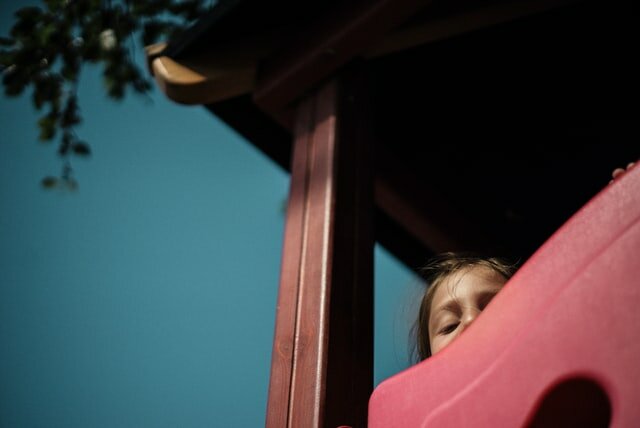What needs to be said that you haven’t yet talked about?” the woman from hospice looked at me. I suspected I knew but remained silent.
My mother, a child of the Depression and a cigarette smoker for seventy years, valued reality, not excess. When she and my father divorced, his accelerating alcoholism limited his ability to work. The weekly child-support checks that I collected from him on our Sunday outings to Mass were not always in hand. Mom worked in odd jobs that came and quickly went. She took factory graveyard shifts or late-evening restaurant work, night jobs that left me alone in a large and scary house during the dark hours, while she did what she could to bring in some money.
Mom was still a young woman and with my father out of picture, she dated. We went to Red’s apartment summer afternoons where they left me to play in the kidney-shaped pool. “He’s loaded,” she told me. “Look at all of those jars of coins in his apartment.” I found that the presence of Red, and others to follow, meant that my search for food would uncover more than a can of frozen orange juice, that I opened and spooned out for my breakfast.
On Saturday mornings Red appeared at our house for coffee. He lifted me onto his lap while he and Mom talked. I felt stuck there. When the phone rang my mother called out, “I’ll get it,” heading toward the living room to pick up the receiver.
I was a product of the times, a rule follower, a child who gave all power to adults. Sitting on this stranger’s lap was not a favorite place for me, and less so when my mother left the room. I sat on one leg, and was held in place by his thick hand. While my mother took care of a brief conversation, his thumb explored my undeveloped nipple.
I said nothing about this. Mom liked him and that was enough to keep me quiet. That tendency to not speak up so that others are not upset allowed more of the same.
Mom liked him and that was enough to keep me quiet.
The next boyfriend was Max. Short and round, his sweaty face atop a bloated neck and many skin tags drew my uncomfortable attention. He acted like the great guy anyone would like. Max took us places. This was a new experience for me, going to ballgames or long drives with him and my mother. I never went to his home, and never sat on his lap.
My mother treated Max as though she hated him. I know his weight had much to do with it. But he took us places. He paid. He had a job. He bought my mother things. I don’t think anything he gave her ever meant anything to her.
When I turned eight, Max told my mother he wanted to take me to Sears and buy me a pair of roller skates for my birthday. I had not been alone with him until then, and was not nervous since I had been around him plenty of times.
Max drove me to Sears and bought me a pair of metal skates, the kind with a key that loosens or tightens the skate to your shoe. He drove us straight back home but instead of parking in the open space where my mother could see his car, and know that we had arrived, he parked further up the street, out of view of the windows of our house.
He told me that since he had been so nice to me that he wanted me to be nice to him. He wanted me to kiss him, something I was used to doing to adults. They all wanted a kiss to be thanked for something. But his hot, fat tongue pushed its way into my mouth and he held me. His other hand dipped into my pants and his finger probed between my legs.
He told me he loved me, and he loved my mother. He loved both of us. I was frozen. He said she couldn’t know because it would hurt her, so I couldn’t say anything. I don’t know how long he kept me in the car, but long enough to raise suspicions.
We entered the house and I heard my mother call out, “What took you so long?” She came into the living room and my face told her everything. “What happened to you?” she said looking directly at me. Max stood a couple of feet behind. I imagined him wiping his sweaty brow. “Nothing,” I said. Her face hardened, staring at me. Then she turned, shrugged her shoulders. “Okay,” she said, and walked toward the kitchen.
Max continued to take us places and if my mother stepped away he began to tell me how much he loved me. When my mother left our seats at a Giants game to go to the restroom, Max tried to give me a woman’s watch that my mother wouldn’t accept from him. I was so embarrassed. It seemed to me that the people sitting in front of us turned and stared. They could hear him. I remember feeling miserable and trapped, on display and invisible at the same time.
***
Changes came quickly as my mother’s cancer progressed. Her voice became garbled between one day and the next; the doctor said she would lose the ability to speak due to tumors in her throat. “I don’t want to lose my voice,” she told me on the phone one day.
Not long after that I visited her. Her voice came and went by then, unreliable. I followed her through the house and on to the sunshine filled deck attached to the kitchen. I didn’t know what to say and decided that just being with her and helping with whatever I could was enough.
I remember looking at the clear sky that day and the old oak shading part of the backyard and felt the comfort this place had given me. She wasn’t in physical pain, but kept glancing at me and I got the impression that there was something she wanted to say. I focused on relaxing, breathing in the familiar, looking at her and smiling. She still seemed strong to me and I wonder why when we were alone that this impression of her didn’t waver. It was when other people were present that her physical stature seemed smaller to me.
I leaned close to her ear and whispered, “I forgive you for everything.”
That was the last time it was just the two of us like that, with her having one of her last good days. Hospice came in periodically to check on her and then the visits became more frequent. Soon she did not leave her bed. One afternoon with only a nurse in the house with us, I leaned close to her ear and whispered, “I forgive you for everything.” Unable to respond or wake up fully, she rolled in her bed as though in a nightmare.
The hospice home visitors frequently joked about my mother being the type of person to go out on her own terms and with her boots on, but now said they thought she would have died weeks earlier. When they asked what needed to be said, I felt I knew the answer.
My mother had not been herself for several days. I am not sure who she recognized when she “spoke” to any of us. Though her words were not clear, to me she often got her point across. I sat with her, my chair in a narrow space between her hospice-supplied adjustable bed and the living room wall. She started talking to me. Her words were poorly enunciated and I am sure no one near could understand what she said. But I heard parts clearly and wished that I could understand everything that she wanted and struggled to say. “I didn’t have anything,” she repeated, looking closely at me to see if I understood. Little money and a young child to care for, to feed. Bills to make so the house would not be taken away.
She repeated, “I had nothing,” and said many other things, made many other sounds. I began nodding at her and saying, “I know, Mom. I know.” She looked at the place in the living room where I had stood over fifty years earlier when she bent over and looked into my face and asked “What happened to you?” and she wailed, “Max.” I nodded and said again, “I know.” She dropped off from the effort.
That was Saturday, and the last time I believe my mother recognized me. Later that weekend, alone with her again, I leaned toward her ear and told her again, “I forgive you for everything.” This time she lay still. I kept sensing that she would die a couple of days later on Tuesday, but true to her own nature, my mother died on Wednesday.
Many weeks later I began grief counseling and soon realized the enormous change my life and my outlook had taken. A sense of the preciousness and beauty of so much of what I laid my eyes on became a trait of my days, and six years after her death, that feeling is still with me. I’m sure this sense of wellbeing is part of normal aging, and maybe the ability to clear things with her added to it.
Damage was done to me, that cannot be denied. But there has always been some sort of path and I get to choose to take it or not. Sometimes I give in to the feelings of disgust for these men and the anger I have over the way they easily took advantage of me as a child. Their actions helped ignite my tendency toward addiction and self-loathing. But they alone did not give me these peculiarities. Maybe because they were outsiders, easy for me to identify as perpetrators, maybe they were also instrumental in my seeking recovery.
I forgave my mother long before her death, and I think that on some level she knew it. She carried her own human foibles but she believed in integrity, of doing the right thing. Obviously, she wasn’t perfect. At other times, she did set an example for living that I know to be a way to a happy and satisfying life.
With therapy and long term recovery I am far removed from the belief that I am worthless. My mother and I enjoyed each other’s company in her last years. I was able to see her to the end with no regrets between us, and to witness her proving again that she loved all that life meant to her. Telling the truth was part of that.
Photo by Harris Ananiadis on Unsplash












